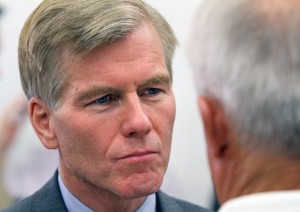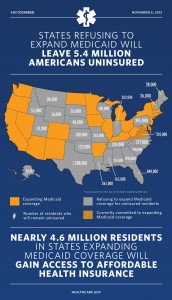
Medicaid Bob
News of former senior McDonnell Administration officials now lobbying in favor of Medicaid expansion has shocked Virginia conservatives. But, unfortunately, it shouldn’t come as a surprise.
When I discuss Medicaid expansion in Virginia with people wondering what all the controversy is about, I explain (right before their eyes glaze over) that it had its roots in actions taken by Republican Governor Bob McDonnell.
“But McDonnell was against Medicaid expansion,” they’ll say, “he said so himself.” And so he did…but he also said something else, something that is central to the way the Medicaid debate continues to unfold.
“Without significant reform…it would not be responsible to expand Medicaid,” McDonnell told WTOP radio just weeks after the Supreme Court ruled Medicaid expansion was an issue for each state to decide.
[Interesting note: McDonnell was so motivated to continue to say expansion was mandatory (which gave him cover to do what he wanted to do), that he earned a PolitiFact “Pants on Fire” rating on the issue.]
The “reform then expand” mantra is just spin intended to make it seem like McDonnell and certain other Republican leaders are against Medicaid expansion, while leaving a back door open for expansion to happen (i.e., “reforms” that would either let them call the expansion by another name, or that would save enough money to cover the eventual drop in federal support for the expanded coverage). Examine the public statements carefully, and when you see comments about the need for reforms first, right after it you’ll almost invariably see an indirect commitment to expansion—or at least the absence of principled opposition to it. Call it the AMINO approach: Anti-Medicaid In Name Only.
Think I’m being too hard on former Gov. McDonnell? Think again. Starting as early as mid-2012, McDonnell’s administration worked feverishly, hand-in-glove with the Obama administration, to see to it that Virginia would be ready to take on this massive new entitlement as soon as funding was available in January 2014. This effort included a number of modest reforms, and seeking all the necessary waivers and approvals from the Center for Medicare and Medicaid Studies. This led the Obama administration to even describe Virginia as “committed to expanding Medicaid coverage” as late as November of last year.
Put simply, the only reason we’re even having this conversation about Medicaid expansion is because the McDonnell administration already paved the way for it. Put another way, a REPUBLICAN administration—aided and abetted by the taxportation deal last year that included budget language authorizing the McDonnell’s team to complete all the necessary work to get ready for expansion—is responsible for helping Terry McAuliffe fulfill his number one campaign promise. Virginia would be nowhere near being able to expand if McDonnell’s people had not been laying the necessary groundwork for most of the last two years. (If you want to see what a principled opponent of Obamacare’s Medicaid expansion, look at Bobby Jindal in Louisiana).

Fmr. Deputy Secretary of Health and Human Services – Office of the Governor, Matt Cobb
It seems that the guy who was just a couple of months ago the number two McDonnell administration official in charge of preparing for Medicaid expansion is now being employed as a lobbyist to do the same thing. From Julian Walker:
Three high-level veterans of former governor Bob McDonnell’s administration, two with South Hampton Roads ties, have newly registered as lobbyists for the pro-Medicaid expansion Virginia Hospital & Healthcare Association.
They are Janet Vestal Kelly, a past secretary of the commonwealth who attended Regent University, and her husband, Ryan; former U.S. Rep. Thelma Drake of Norfolk, who was McDonnell’s public transit director; and Matt Cobb, a deputy health secretary under McDonnell.
So, this really should not come as a surprise.
Here’s a few other things that shouldn’t be a surprise as we near the open of the special session of the General Assembly to deal with the budget and Medicaid expansion:
- Republican members of the House of Delegates are in a pressure cooker right now. The grassroots and, for now, the leadership are absolute in their opposition to any sort of expansion of Medicaid. But, all kinds of well-funded lobby interests are in favor of expansion, and the state’s budget hangs in the balance, with the ever-present “nuclear option” threat that the Governor could expand Medicaid on his own if the legislature refuses to act. Hence, we should not be surprised if, as Norm Leahy remarked, there may be cracks in the foundation of anti-Medicaid resolve in the House.
- Those cracks may manifest themselves in a variety of alternative proposals. Expansion proponents may talk about “private sector” and “free market” alternatives. For instance, Del. Jimmie Massie (R-Richmond), in an uncharacteristic break with the otherwise sterling message discipline among the House GOP caucus, said “[I]t’s going to look like private options. In other words, we’re going to take the money from the federal government that will allow these uncovered people to buy their own health insurance.” But it is no surprise that there is nothing “private sector” or “free market” about forcible redistribution of tax dollars.
- Politically, Republicans simply cannot sign on to anything that immediately or permanently expands Medicaid. Therefore, if/when a deal is made, don’t be surprised if it comes in the form of something that will be characterized as a “trial” or a “pilot” program that doesn’t fully expand Medicaid immediately, or that provides some cosmetic basis for further study of reforms. The hope here would be to escape voter anger, not to actually kill Obamacare or Medicaid expansion—so that lawmakers can let expansion happen but still tell the voters back home about how they fought the good fight against Obamacare.
- The special session begins on March 24, and may last into June. One of the less-examined lessons from last year’s Virginia elections is the volatility of grassroots anger animated by the infamous taxportation bill passed by Republicans, which ended up being channeled into the nomination of tea party firebrand E.W. Jackson for Lieutenant Governor, a nomination that left “establishment” leaders ashen faced and horrified (and not without good reason). If/when there is a deal on Medicaid, don’t be surprised if it is delayed until after the Congressional primaries and the U.S. Senate nominating convention in early June, thus blunting the impact of grassroots outrage.
Unfortunately, very little is surprising on this issue. However, one thing that is surprising, and downright vexing, is just how successful the “reform then expand” sleight of hand has been in convincing Republicans that the people using it are somehow actually opposed to Medicaid expansion. Surprise, surprise! They’re not.

